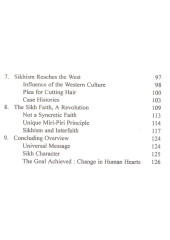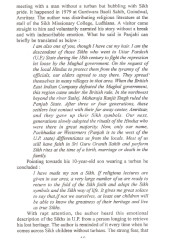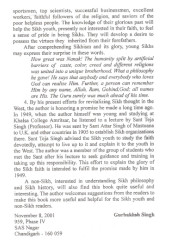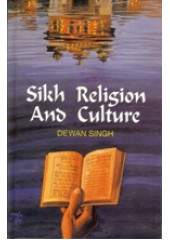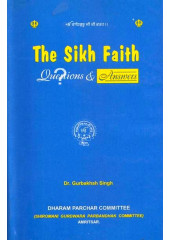Monday to Saturday - 10:00 Am to 9 PM
Now Enjoy Bulk Discounts on Books as Mentioned Below
These Discounts are in addition to the Discounts on Individual Books (Visible as Bulk Discount for Books in Cart)
Extra 10% Off If Books Purchased Exceeds Rs 3000 or 75 USD or 60 GBP or 60 Euro or 100 AUD or 100 CAD
Extra 15% Off If Books Purchased Exceeds Rs 6000 or 150 USD or 120 GBP or 120 Euro or 200 AUD or 200 CAD
Extra 20% Off If Books Purchased Exceeds Rs 15000 or 225 USD or 180 GBP or 180 Euro or 300 AUD or 300 CAD
Extra 25% Off If Books Purchased Exceeds Rs 30000 or 300 USD or 240 GBP or 240 Euro or 400 AUD or 400 CAD
Table Of Contents For 'The Sikh Faith - A Universal Message' Book By Gurbaksh Singh
|
CONTENTS |
Page No | |
| ---Preface | 9 | |
| ---Acknowledgements | 13 | |
| 1. | Sikhism Founded | 15 |
| Society and Religion | 15 | |
| A Revolutionary Thought | 18 | |
| Growth of Sikhism | 24 | |
| 2. | Repression of the Sikh Faith | 34 |
| Army Attacks | 35 | |
| The New Centre, Kiratpur | 36 | |
| The War Won | 45 | |
| 3. | Shri Guru Granth Sahib | 47 |
| Message of Sri Guru Granth Sahib | 49 | |
| Universal Faith | 51 | |
| The Sikh Code of Conduct | 57 | |
| 4. | Founding of the Khalsa | 64 |
| The Khalsa Code | 65 | |
| Mandate to the Khalsa | 67 | |
| Uniqueness of the Sikh Faith | 70 | |
| 5. | The Guru Khalsa Panth | 72 |
| Martyrdom of Bhai Mani Singh | 76 | |
| Hunting and Torture of the Sikhs | 77 | |
| The First Sikh Holocaust | 79 | |
| Martyrdom of Baba Deep Singh | 80 | |
| The Second Sikh Holocaust | 82 | |
| The Fearless Sikhs | 83 | |
| Governorship to the Khalsa | 85 | |
| The Rule of the Khalsa | 86 | |
| 6. | Renaissance of Sikh Faith | 88 |
| Violence by the State | 89 | |
| The Climax | 92 | |
| The Victory | 93 | |
| After the Victory | 94 | |
| 7. | Sikhism Reaches the West | 97 |
| Influence of the Western Culture | 98 | |
| Plea for Cutting Hair | 100 | |
| Case Histories | 103 | |
| 8. | The Sikh Faith, A Revolution | 109 |
| Not a Syncretic Faith | 113 | |
| Unique Miri-Piri Principal | 114 | |
| Sikhism and Interfaith | 117 | |
| 9. | Concluding Overview | 124 |
| Universal Message | 124 | |
| Sikh Character | 125 | |
| The Goal Achieved : Change in Human Hearts | 126 |
Sikhism took birth in the East in Punjab, India, five centuries ago. Sikhs have settled all over the world not as conquerors of new lands. as the Europeans did four centuries ago, but as seekers of new opportunities in life. With them, the Sikhs carried their unique appearance and their unique philosophy. To the West, Sikhs migrated in the later part of the nineteenth century. Wherever they went, they established their gurdwaras (worship places). In the first two decades of this century gurdwaras were founded in Vancouver, Canada, Stockton, USA, and London, U.K, to name a few. Now almost all large cities in the West have a gurdwara; many have more than one.
Gurdwaras in North America formed their Sikh Council in 1979. They got together annually to discuss Sikh affairs in the West. In May 1984, the Council invited the author to give a lecture on Sikhism during its annual function in Los Angeles. Later the author moved to Washington, D.C., where he gave a series of discourses on basic principles of the Sikh faith in the gurdwara managed by the Guru Nanak Foundation of America. The author explained how the principles of the Sikh faith have been considered suitable by modern scholars for adoption by the whole of humanity. Some members of the congregation, desired that these lectures should be written in the form of a book for those who could not attend the gurdwara regularly.
The author was invited by many Sikh families to hold detailed discussions with Sikh youth. These discussions convinced him of the need for a small book describing the principles of the faith in terms, which were meaningful to the Western youth. These young people have little time to read long stories and details about the life of the Sikh Gurus. However, they are interested in understanding the development of the Sikh faith and its philosophy. They want to know how the Sikh philosophy can help them today in the Western environment and in a society, which emphasizes the scientific approach to every discipline. This book was written to meet their needs.
Another motivation for writting this book was an incidental meeting with a man without a turban but bubbling with Sikh pride. It happened in 1979 at Gurdwara Baoli Sahib, Goindwal, Amritsar. The author was distributing religious literature at the stall of the Sikh Missionary College, Ludhiana. A visitor came straight to him and voluntarily narrated his story without a break and with indescribable emotion. What he said in Panjabi can briefly be translated as below :
| I am also one of you, though I have cut my hair. I am the |
| descendant of those Sikhs who went to Uttar Pardesh |
| (U.P.) State during the 18th century to fight the repression |
| let loose by the Mughal government. On the request of |
| the local Hindus to protect them from the tyranny of the |
| officials, our elders agreed to stay there. They spread |
| themselves in many villages in that area. When the British |
| East Indian Company defeated the Mughal government |
| this region came under the British rule. In the northwest |
| beyond the river Sutlej. Maharaja Ranjit Singh ruled the |
| Panjab State. After three or four generations, these |
| settlers lost contact with their far away center, Amritsar, |
| and they gave up their Sikh symbols. Our next, |
| generations slowly adopted the rituals of the Hindu who |
| were there in great majority. Now, only our name, |
| Pachhadas or Westerners (Panjab is to the west of the |
| U.P. state) differentiates us from the locals. Most of us |
| still have faith in Sri Guru Granth Sahib and perform |
| Sikh rites at the time of a birth, marriage or death in the family. |
Pointing towards his 10-year-old son wearing a turban he concluded :
| I have made my son a Sikh. If religious lectures are |
| given in our area, a very large number of us are ready to |
| return to the fold of the Sikh faith and adopt the Sikh |
| symbols and the Sikh way of life. It gives me great solace |
| to say that, if not we ourselves, at least our children will |
| be able to know the greatness of their heritage and live |
| as true Sikhs. |
With rapt attention, the author heard this emotional description of the Sikhs in U.P. from a person longing to retrieve his lost heritage. The author is reminded of it every time when he comes across Sikh children without turbans. The strong fear, that most of the next Sikh generation in the West will be without Sikh symbols and that their children may know little of the Sikh faith, haunts the author all the time. Many Sikh parents in the West are constantly worried by the same thought. In fact they fear that the Sikh symbols will fall into disuse in the West even faster than in U.P. Many first-generation immigrants to Europe and America have already removed their Sikh symbols, while it were the third or fourth generation Sikhs who did so in U.P. The language barrier will further hasten this trend. Many Sikh children born in the USA, U.K. or Canada read Gurbani; some cannot even speak Panjabi properly.
Instead of simply feeling alarmed by reading these observations, we should make efforts to check this trend. If we, the parents, the first and second generations immigrants, resolve to live as Sikhs and guide (not by force, but through education and example) our children to the Sikh way of life, we can feel assured that Sikhism will be retained as the religion of the future generations. This will bring peace not only to the Sikh youth but also to all those who came in contact with them.
This book is, therefore, intended to explain the rationality of the Sikh faith and describe the high esteem in which the principles of Sikhism are held by the modern thinkers in the West. This knowledge will help stop the erosion of the Sikh faith taking place in the minds of the Western youth. Modern youth need to be educated to feel the urge for peace and pleasure of life explained in Sri Guru Granth Sahib. They also need to be told that Sikhs have a reputation as brave, fearless saint-soldiers (who defend rather than attack the rights of the weak), high class
1. Hundreds of North American Sikh youth trained at the Sikh heritage camps started in 1970, not only understand the greatness of their faith. but they can also explain it to their friends of European origin. They are happy to wear the Sikh symbols. Many of them now (1998) are doctors, professionals, engineers, teachers, etc. They act as good role models for other youth. They motivate other Sikh youth to enjoy the self-esteem of living like a Sikh and appearing like a Sikh. Many of them can recite, sing and interpret Gurbani. Further, they can also relate it to their lives. Though, there is no formal survey, but many people, based on their observations, agree that a higher percentage of North American youth can sing Gurbani than those in their homeland, Panjab.
sportsmen, top scientists, successful businessmen, excellent workers, faithful followers of the religion and saviors of the poor helpless people. The knowledge of their glorious past will help the Sikh youth, presently not interested in their faith, to feel a sense of pride in being Sikhs. They will develop a desire to possess the virtues they inherited from their forefathers.
After comprehending Sikhism and its glory, young Sikhs may express their surprise in these words.
| How great was Nanak! The humanity split by artificial |
| barriers of caste, color, creed and different religious |
| was united into a unique brotherhood. What a philosophy |
| he gave! He says that anybody and everybody who loves |
| God can realize Him. Further, a person can remember |
| Him by any name, Allah, Ram, Gobind, God; all names |
| are His. The Guru surely was much ahead of his time. |
By his present efforts for revitalizing Sikh thought in the West, the author is honoring a promise he made a long time ago. In 1949, when the author himself was young and studying at Khalsa College Amritsar, he listened to a lecture by Sant Teja Singh (Professor). He was sent by Sant Attar Singh of Mastuana to U.K. and other countries in 1905 to establish Sikh organizations there. Sant Teja Singh advised the Sikh youth to study the faith devotedly, attempt to live up to it and explain it to the youth in the West. The author was a member of the group of students who met the Sant after his lecture to seek guidance and training in taking up this responsibility. This effort to explain the glory of the Sikh faith is intended to fulfil the promise made by him in 1949.
A non-Sikh, interested in understanding Sikh philosophy and Sikh history, will also find this book quite useful and interesting. The author welcomes suggestions from the readers to make this book more useful and helpful for the Sikh youth and non-Sikh readers.
Gurbakhsh Singh
| Books | |
| Author | Gurbaksh Singh |
| Pages | 152 |
| Cover | Hardbound |
| Language | English |
The Sikh Faith - A Universal Message - Book By Gurbaksh Singh
- Brand: Singh Brothers
- Product Code: SPE119
- Availability: In Stock
-
Rs.60.00
Related Products
Teaching Sikh Heritage to The Youth ( Set Of II Books ) - Book By Gurbaksh Singh
Table Of Contents For (Part I) 'Teaching Sikh Heritage to The Youth-Book By Gurbaksh Singh ..
Rs.180.00
Sikh Religion and Culture - Book By Dewan Singh
Table Of Contents For 'Sikh Religion and Culture' Book By Dewan Singh ..
Rs.90.00
Sikhs Under Brahmanical Siege - Book By Dr Gurbakhsh Singh
Summary Of 'Sikhs Under Brahmanical Siege' By Dr Gurbakhsh Singh This book was originally..
Rs.100.00
Real Sikhism - Book By Surinder Singh Kohli
Introduction To 'Real Sikhism' By Surinder Singh Kohli The misinterpretation of Sikhism due t..
Rs.500.00
The Sikh Faith - Questions and Answers - Book By Dr. Gurbakhsh Singh
Foreword To The Book 'The Sikh Faith - Questions and Answers' By Dr. Gurbakhsh Singh During t..
Rs.40.00
Tags: books concepts of sikhism, books on gurbani essence, books on gurmat philosophy, books on message of gurbani, books on rehat maryada, books on sikh attributes, books on sikh faith, books on sikh identity, books on sikh ideology, books on sikh philosophy, books on sikh qualities, books on understanding gurbani the, universal, gurbaksh, singh, english



